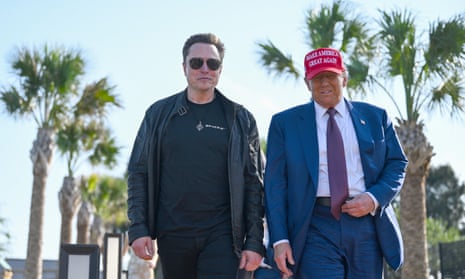The tech industry’s investments in the Trump campaign appear to be paying off. Since taking office, the new administration has issued a series of directives relaxing regulations and ending legal battles against tech companies, including those in the crypto, AI, and social media sectors. Many of these companies and their leaders made significant donations to Trump’s campaign.

Central to these moves is Elon Musk, CEO of several technology companies and the world’s richest man. Federal agencies under the president’s authority have dropped legal challenges against Musk’s SpaceX and the largest U.S. cryptocurrency exchange. Furthermore, the White House has launched a “deregulatory initiative,” aimed at loosening tech-sector regulations and empowering Musk’s Doge project, which is tasked with cutting federal regulations and spending. Musk contributed nearly $300 million to the president’s re-election.
On Friday, Coinbase announced the Securities and Exchange Commission (SEC) planned to dismiss its lawsuit against the cryptocurrency exchange. The same day, the Department of Justice withdrew its discrimination case against SpaceX. These actions reflect a pattern of friendliness toward the tech industry and its leading figures.
The administration is also cutting regulatory safeguards on artificial intelligence, which Silicon Valley CEOs have long considered overly burdensome. The body responsible for testing the safety of cutting-edge AI models is preparing for layoffs, following a White House decision two weeks ago to roll back an executive order by Joe Biden designed to ensure AI safety.
In addition to Musk, other tech CEOs appear to be finding favor with the administration, having donated to Trump’s inaugural committee and participating in closed-door meetings with the president. Some tech companies had contentious relationships with the first Trump administration, but things have changed. Gautam Hans, a law professor at Cornell, noted that the attendance of tech leaders at the inauguration demonstrated their hope for favorable treatment. He added that Trump’s actions “reflect a litany of long-term conservative grievances and aggressive deregulatory arguments.”
A month before the SEC announced its case dismissal, Coinbase donated $1 million to Trump’s inaugural fund. Paul Grewal, Coinbase’s chief legal officer, stated in a blog post, “SEC staff has agreed in principle to dismiss its unlawful enforcement case against Coinbase, subject to commissioner approval — righting a major wrong.”
The Trump administration is taking a more favorable approach to the cryptocurrency sector. Trump has stated he will be the “crypto president” and nominated crypto-friendly commissioner Paul Atkins to lead the SEC, replacing Gary Gensler, who was seen as adversarial.
Public Citizen, a consumer protection advocacy group, suggests the SEC’s decision “proves that the crypto industry’s flood of campaign spending has paid off.”
Trump has signed an executive order aimed at reducing regulations. The order, described as a “deregulatory initiative,” echoes the goals of Musk and Doge to cut federal spending and regulation, which could benefit the tech industry. The order dictates that Doge, along with the director of the Office of Management and Budget, will “rescind unlawful regulations” by conducting a review of all of them. The timeline to complete this review is 60 days. The list of “unlawful regulations” includes those giving too much power to Congress or imposing significant costs on private parties, and those that impede tech innovation.
Silicon Valley has long criticized federal regulations, particularly those related to anti-competitive behavior, monopolistic practices, and labor and consumer safety standards. The Federal Trade Commission (FTC) and the Justice Department have filed antitrust and discrimination cases against major tech companies. Some lawyers are questioning the legality and feasibility of Trump’s new deregulatory executive order under existing administrative law.
Administration officials have signaled a belief that previous administrations over-regulated the technology industry and created barriers to innovation, particularly in AI. Vice President JD Vance emphasized the administration’s focus on “AI opportunity” rather than “AI safety” at the global AI Action Summit. Trump has already rescinded a sweeping AI executive order by Biden. As a result, the non-regulatory body charged with testing the industry’s most powerful AI models is facing layoffs. Concerns were noted about the AI Safety Institute (AISI), which was developed within the NIST. Alexandra Reeve Givens, from the Center for Democracy and Technology, noted that the AISI was designed to play a “commonsense role coordinating the kind of work that needs to happen for the entire industry to succeed.”
While Trump has made tech-friendly moves so far, his administration also plans to use its regulators to threaten the tech industry if there is a perceived downturn in the industry’s relationship with the president. Andrew Ferguson, the new chair of the FTC, launched an official inquiry into “big tech censorship.”


